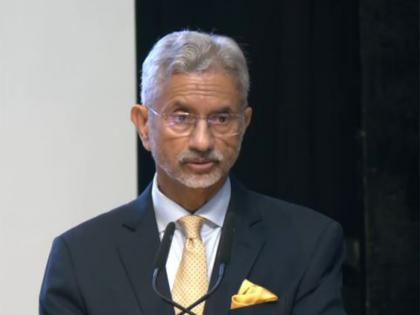UN still reflects "realities of 1945, not of 2025": Jaishankar calls for urgent reforms at UNTCC chiefs conclave
By ANI | Updated: October 16, 2025 14:35 IST2025-10-16T14:32:31+5:302025-10-16T14:35:28+5:30
New Delhi [India], October 16 : External Affairs Minister S Jaishankar on Thursday called for urgent and decisive reform ...

UN still reflects "realities of 1945, not of 2025": Jaishankar calls for urgent reforms at UNTCC chiefs conclave
New Delhi [India], October 16 : External Affairs Minister S Jaishankar on Thursday called for urgent and decisive reform of the United Nations, warning that the institution risks "irrelevance" and "eroding legitimacy" if it fails to adapt to 21st-century realities.
Addressing the United Nations Troop Contributing Countries Chiefs' Conclave, UNTCC in New Delhi he said that the UN still reflects "the realities of 1945, not of 2025," despite the massive geopolitical changes and in global membership having quadrupled over the last 80 years.
"For the UN to be effective, it must reform, becoming more inclusive, democratic, participative, and representative of today's world," Jaishankar asserted. He added that reform must amplify the voices of the developing world and reflect the aspirations of the rising Global South.
"Institutions that fail to adapt risk irrelevance, not just irrelevance but eroding legitimacy, and leaving us without recourse in times of uncertainty," he said.
Jaishankar was addressing the gathering of military leaders from UN's Troop Contributing Countries, whom he described as "the architects, the upholders and the messengers of peace."
Chief of Army Staff General Updedra Dwivedi and Permanent Representative of India to the UN, Parvathaneni Harish were among those who attended the event.
The Union Minister confirmed India's strong desire for the expansion of both the permanent and non-permanent categories of the UN Security Council, while regretting that the reform process itself is being used to "derail that agenda," allowing "historical injustices" to still continue. India affirmed its commitment to assume greater responsibilities within a reformed multilateral system.
Jaishankar noted that India is the world's largest cumulative troop contributor to UN peacekeeping, highlighted its importance as the UN's most effective instrument and simultaneously flagged critical operational challenges.
"UN peacekeeping, since its inception, it has been a testament to what we can achieve when nations unite for a larger cause. Our peacekeepers have been really a powerful force for good. These brave sons and daughters put their lives on the line to protect civilians, to deliver humanitarian aid, and to support fragile peace processes. They are the real torchbearers of multilateralism. Now, let me honour today the more than 4,000 UN and 182 Indian peacekeepers who have made the ultimate sacrifice in the line of duty," he said.
"They stand out as a testament to bravery, and their legacy remains a solemn call to action for all of us. We must ensure that their message lives on," Jaishankar said.
The External Affairs Minister stressed that the nature of conflict has fundamentally changed, moving away from clear state-on-state warfare to a complex matrix involving non-state actors, armed groups, and terrorist organisations using asymmetric tactics like IEDs and cyber warfare.
"The traditional role of a peacekeeper as a buffer between two warring states has also evolved significantly," he said, demanding a "new paradigm" that requires enhanced training, sophisticated technology, and a re-evaluation of mandates to ensure peacekeepers can deal with asymmetric threats.
The External Affairs Minister also outlined seven key concerns for collective consideration to strengthen peacekeeping.
These include consultations with troop-contributing countries and host states, which must be consulted when formulating mission mandates. He said that mandates must be commensurate with allocated resources and the mandates must be realistic and clear. The primary responsibility for protecting civilians lies with the host state.
He said India stands ready to be a technology demonstrator to enhance operational capacity. Further, he noted that countering misinformation and disinformation through ICT is vital and lastly that perpetrators of any attack on peacekeepers must be brought to justice.
Underscoring India's long-standing commitment to UN peace operations, Jaishankar added, "For India, participation in UN peace operations is a profound expression of our responsibility as a member state and of our belief in global commitments. Since inception, we have contributed over 300,000 troops cumulatively, making us the world's largest troop-contributing country."
"Our peacekeepers have served and are serving with distinction and professionalism in some of the world's most challenging theatres, including South Sudan, Lebanon, Syria and the DRC. This sustained commitment stems from our conviction that peace anywhere strengthens peace everywhere," he said.
The United Nations Troop Contributing Countries' (UNTCC) Chiefs' Conclave held in New Delhi from October 14-16 was hosted by the Indian Army.
Defence Minister Rajnath Singh, Chief of Defence Staff, General Anil Chauhan, Chief of the Army Staff, General Upendra Dwivedi, Chief of the Air Staff Air Chief Marshal Amar Preet Singh, Under-Secretary-General for Peace Operations (USG, DPO) Jean Pierre Lacroix, the Permanent Representative of India to the United Nations, Ambassador Parvathaneni Harish, along with senior serving officers and bureaucrats witnessed the inaugural day's events along with other distinguished invitees to collectively chart the future of global peace operations.
Disclaimer: This post has been auto-published from an agency feed without any modifications to the text and has not been reviewed by an editor
Open in app